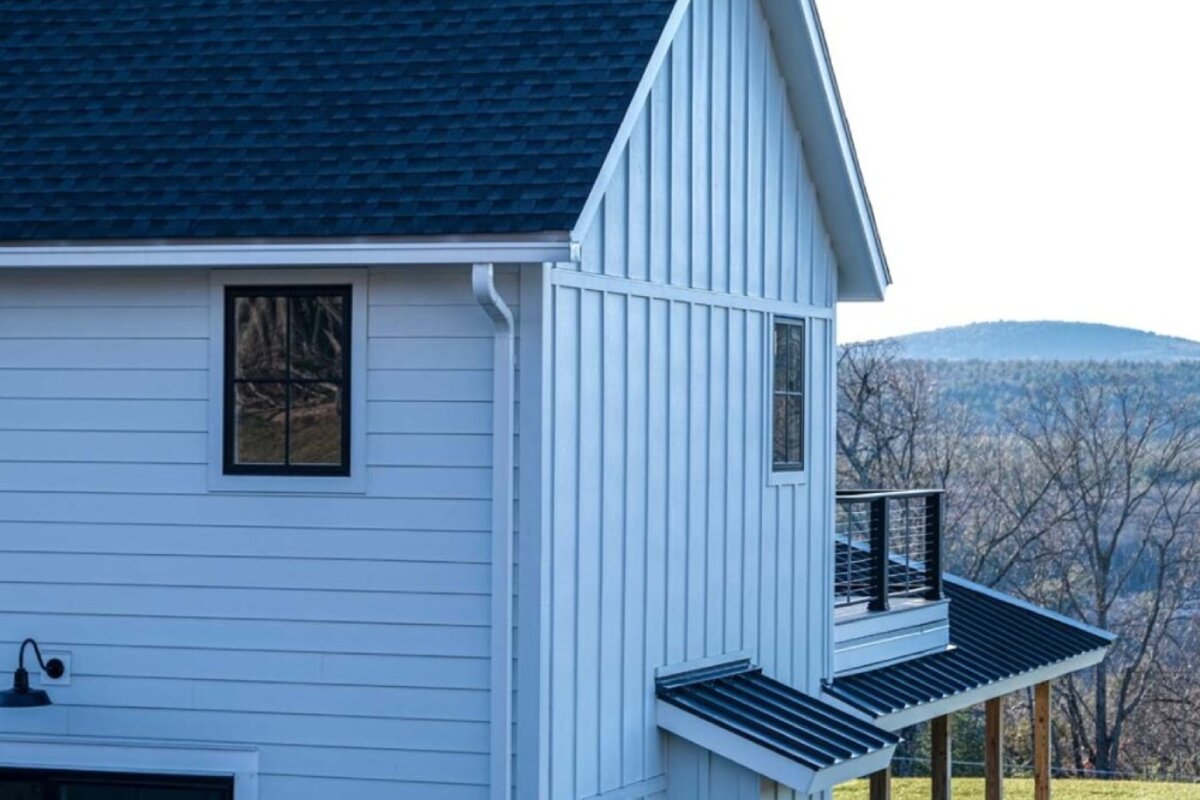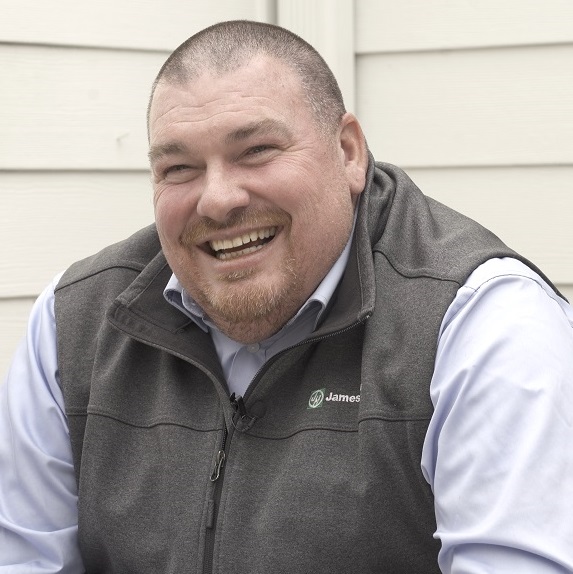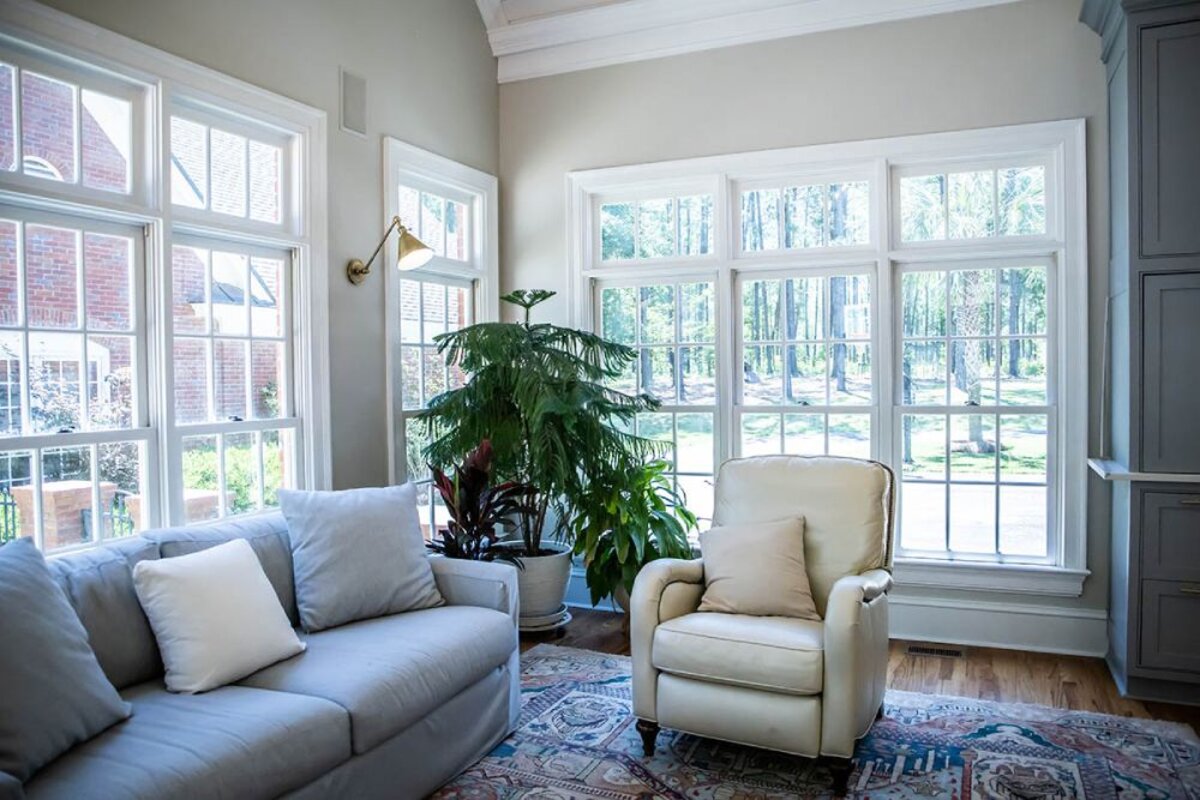If you’re looking for a siding option that looks sharp and lasts for decades, Hardie board and batten is worth a close look. It’s a style with deep roots that still feels current in today’s homes.
Here we break down how the system works, the benefits of using James Hardie materials, what the average project costs, and how we install it the right way.
What is Board and Batten Siding?
Board and batten is a vertical siding look. Wide panels form the main surface. Narrow trim strips cover the seams. The lines create a clean pattern that works on many home styles, from modern farmhouse to classic cottage.
How the System Works
- Panels: Hardie® Panel vertical siding is the base.
- Battens: Hardie® Trim Boards act as the battens.
- Layout: We set a steady spacing so the eye reads clean, even lines.
- Finish: You can choose smooth or woodgrain looks and factory baked-on color.
Traditional Roots and Today’s Use
The look started on barns and farmhouses because it was simple and tight. Today, fiber cement brings the same look with better strength, less upkeep, and many color choices.
Why Choose Hardie Board and Batten for Chicagoland Homes
Built for Local Weather
Chicago winters bring freeze and thaw cycles, snow, wind, and moisture. James Hardie fiber cement is made to handle these conditions. It does not rot, swell, or attract pests.
Color That Lasts
ColorPlus® Technology gives you even, factory-applied color. It resists fading and helps paint last longer than a typical field paint job.
Warranty and Peace of Mind
James Hardie offers strong product warranties. We register your job and review care steps at the final walkthrough so you know exactly how to protect your investment.
Benefits You Will Notice
Curb Appeal and Versatility
Vertical lines add height and crisp detail. You can use the look on a full façade or as an accent on gables, dormers, or an entry.
Strength with Low Maintenance
Fiber cement stands up to fire, insects, and moisture. You do not need yearly staining. Routine cleaning with a garden hose and soft brush is usually enough.
Long-Term Value
Quality materials and clean installation raise buyer interest. The style feels current and classic at the same time, which helps the value hold up over the years.
Design Ideas That Work
Full Façade or Accent Zones
Some homes look great with a full vertical layout. Others come alive by using board and batten on gables and lap siding on the main walls. If you want the clean lines of Hardie board and batten across the entire front, we can help you pick a spacing that reads modern without looking busy.
Mix Profiles for Balance
Pair vertical panels with HardiePlank® lap siding or Hardie® Shingle for texture changes at level breaks. This can define entries, porches, and upper levels.
Color Tips
Crisp whites feel bright and timeless. Deep charcoals deliver a bold, modern look. Two-tone schemes with light panels and darker trim can frame windows and doors in a strong way.
Cost Factors To Plan For
Every home is different, so we start with a clear site check and a line-by-line proposal.
Materials and Trim Details
Your panel choice, batten thickness, corner boards, window trims, and soffit work all affect price. Extra detail means more cuts and more precision.
Labor and Site Conditions
Tear-off of old siding, repairs to sheathing, and access around the home can add time. We include weather barrier, flashing, caulk, and fasteners in our scope so you see the full picture.
How We Help You Control Your Budget
We offer good-better-best options. We show renderings so you can see where accents add the most value. We confirm measurements and trim counts before we place orders.
Our Installation Process
We follow James Hardie’s best practices on every step. We install Hardie board and batten with care so seams stay tight and lines stay straight.
Step 1: Consultation and Design
We walk the exterior, note problem spots, and discuss goals. We review styles, colors, and trim sizes. You get a clear plan and timeline.
Step 2: Material Ordering and Prep
We verify takeoffs, place orders, and schedule delivery. Your yard and plants get site protection. We set up safe work zones and daily cleanup.
Step 3: Professional Installation
Old materials come off as needed. We inspect sheathing and repair if required. The weather barrier and flashing go on next. We set panels plumb, then add battens at the agreed spacing. Corners, window trims, and sealant complete the system.
Step 4: Final Walkthrough and Support
We clean the site, review the work with you, share care tips, and register warranties.
Board and Batten vs Other Siding Styles
Lap Siding
Horizontal lap fits many suburban homes and can make long walls feel calm. It pairs well with vertical accents in gables.
Shingle Siding
Shingles add small-scale texture. They work nicely on dormers or to soften tall façades.
When To Mix Styles
Many homes look best with a mix. Vertical on gables, lap on main walls, and a bold entry trim can deliver balance and interest.
How To Get Started With All Star
We are a local, factory-trained team that focuses on education first. We bring samples, show spacing options, and provide renderings so you can see the look before work begins. If you want a clear plan, strong communication, and clean workmanship, we are ready to help.
FAQs
How long does it last?
James Hardie fiber cement is built for decades of performance with basic care.
Can it go on the whole house?
Yes. We also use it as an accent when a full façade is not the right fit.
What maintenance is needed?
Simple washing and an occasional check of caulk lines are usually enough.
Will it help resale?
A modern, durable exterior draws buyers and can support higher offers.
How do I get a quote?
Contact All Star Windows & Siding for a free, no-pressure consultation.
Ready to Plan Your Project?
Schedule a visit with All Star Windows & Siding. We will bring samples, confirm measurements, and design a vertical look that fits your home and budget.






